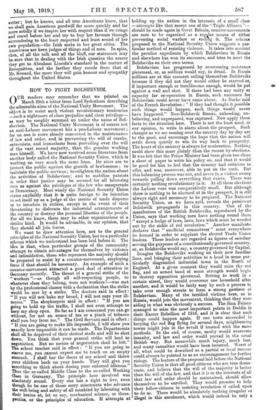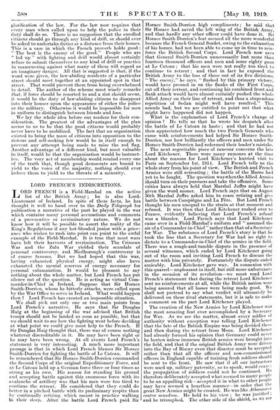HOW TO FIGHT BOLSHEVISM.
n1JR readers may remember that we printed on 1._1 March 29th a letter from Lord Sydenham describing the admirable aims of the National Unity Movement. The object is to resist such violent revolutionary tendencies —such a nightmare of class prejudice and class privilege— as; may be roughly Bummed up under the name of Bol- shevism. The National Unity Movement is of course not an anti-Labour movement but a pro-Labour movement ; for no one is more closely concerned in the maintenance of law and order, and in preventing the will of cranks, extremists, and iconoclasts from prevailing over the will of the vast sound majority, than the genuine working man himself. We have now received some literature from another body called the National Security Union, which is working on very much the same lines. Its aims are to protect the public against the growth of lawlessness ; to maintain the public services; to enlighten the nation about the activities of Bolshevism; and to mobilize patriots in order that justice may be secured for all labouring men as against the privileges of the few who masquerade as Democracy. Most wisely the National Security Union states explicitly that it is quite foreign to its intention to set itself up as a judge of the merits of trade disputes or to interfere in strikes, except in the event of their threatening to dislocate the industrial arrangements of the country or destroy the personal liberties of the people. For all we know, there may be other organizations of a similar kind. It would be advisable, in our opinion, that they should all join forces. We want to draw attention here, not to the general principles of the National Security Union, but to a particular scheme which we understand has been laid before it. The idea is that, when particular groups of the community attempt to obtain advantages for themselves by violence and intimidation, those who represent the majority should be prepared to resist by a counter-movement, employing force if that should be necessary. An example of such a counter-movement attracted a good deal of attention in Germany recently. The threat of a general strike of the " workers "—as though all self-respecting people, to whatever class they belong, were not workers I—was met by the professional classes with a declaration that the strike would be met by a strike. The doctors said in effect : " If you will not bake my bread, I will not cure your ill- nesses." The shopkeepers said in effect : " If you are going to hold up the traffic, I shall not even attempt to keep my shop open. So far as I am concerned you can go without, for not an ounce of tea or a pinch of tobacco shall you buy from me." The Civil Servant said in effect : " If you are going to make life impossible, I will show you exactly how impossible it can be made. The Departments shall all be deprived of their clerical staffs and will be shut down. You think that your general strike will lead to negotiation. But no means of negotiation shall be left." The school teacher said in effect : " If you are going to starve me, you cannot expect me to teach on an empty stomach. I shall bar the doors of my school and throw your children back on your hands. They will give you something to think about during your enforced idleness." Thus the so-called Middle Class to the so-called Working Class in Germany. The principle here involved was absolutely sound. Every one has a right to live, even though he be one of those sorry miscreants who advance the well-being and safety of all mankind by labouring with their brains at, let us say, mechanical science, or thera- peutics, or the principles of education. If attempts at
holding up the nation in the interests of a small class —attempts like that recent one of the " Triple Affiance"— should be made again in Great Britain, counter-movements are sure to be organized as a reviler means of either preventing social warfare or endiag it. The scheme proposed to the National Security Union suggests a par- ticular method of resisting violence. It takes into account the peculiar expedients by which Bolshevism in Russia and elsewhere has won its successes, and tries to meet the Bolsheviks on their own terms.
Bolshevism has progressed by overcoming resistance piecemeal, or, as soldiers would say, in detail. In Russia millions are at this moment calling themselves Bolsheviks because if they did not they would either be starved or if important enough or troublesome enough, would be put
against a wall and shot. If there had been any unity or capacity for co-operation in Russia, such successes for Bolshevism could never have come about. As Burke said of the French Revolution : " If they had thought it possible such things would happen, such things would never have happened." Non-Bolshevik Russia, unheeding, un- believing, and unprepared, was captured. Now apply these facts to the situation here. There is not the least need, in our opinion, to write in alarm about the prospect. Such changes as we see-coming over the country day by day are to the good, and encourage the hope that the nation will settle down quietly to win its way back to prosperity. The heart of the country is always for moderation. Nothing could show this more plainly than the recent by-elections. It was felt that the Prime Minister had been given too clean a sheet of paper to write his policy on, and that it would be good for him to feel that the country had criticism to
offer, and was, moreover, able to put on the curb. But this balancing process was not, and never is, a violent swoop towards pulling down everything that exists. There was certainly nothing revolutionary in it. At all these elections the Labour vote was comparatively small. But although there is nothing to be alarmed at in the prospect, it is still always right and necessary to be prephred. The National Security Union, as we have said, reveals the persistent Bolshevik propaganda in this country. One of the manifestoes of the British Bolsheviks, reproduced by the Union, says that working men have nothing round them " except a hedge of laws, laws, laws which must be weeded out by the sickle of red revolution." Another manifesto declares that " unofficial committees " must everywhere be formed in order to supplant the elected Trade Union leaders. These leaders are regarded as figures of sawdust serving the purposes of a constitutionally governed country, or, as Bolsheviks would say, a country governed by Capital. Imagine the Bolsheviks working on their now familiar lines, and bringing their activities to a head in some par- ticularly disgruntled industrial town in the North of England. At a given moment they would raise the red flag, and an armed band of some strength would begin to destroy opposition piecemeal. Setting to work in a certain street, they would overcome one household after another, and it would be fairly easy by such a process to take over enough streets to form a strong garrison of Bolshevism. Many of the, terrified victims here, as in Russia, would join the movement, thinking that they were siding in what was obviously a success. The Sinn Feiners managed to seize the most important points in Dublin in their Easter Rebellion of 1916, and it is clear that such e ain things could happen a . If one town succeeded in
keeping the red. flag flying for several days, neighbouring towns might join in t e revolt if treated with the same methods. In the end, of course, sanity would overcome insanity, and law and order would prevail in the usual British way. But meanwhile much injury, .much loss, and many casualties would have been incurred. Worst of all, what could be described as a partial or local success could always be pointed to as an encouragement for further risings. The feature of the proposal laid before the National Security Union is that all good citizens who are true demo- crats, and believe that the will of the majority is better than the will of the few, and that it is in the interests of all that law and order should be maintained, should allow themselves to be enrolled. They would promise to help their fellow-citizens in resisting revolution if called upon to do so. There would be absolutely nothing irregular or illegal in this enrolment, which would indeed be only a
glorification of the law. For the law now requires that every man when called upon to help the police in their duty shall do so. There is no suggestion that the enrolled citizens should go through any kind of drill, or should ever be asked to undertake duties at a distance from their homes. This is a case in which the French proverb holds good : " The best is the enemy of the good." People who are " fed up " with fighting and drill would almost certainly refuse to submit themselves to any kind of drill or practice in manmuvring against what many of them will regard as an imaginary danger. All that is suggested is that, if the word were given, the law-abiding residents of a particular street should meet together at an appointed spot in that street. That would prevent them from being overwhelmed in detail. The author of the scheme most wisely remarks that, if force should be resorted to and a riot should occur, it would be the duty of law-abiding citizens to disappear into their houses upon the appearance of either the police or the military. Otherwise it would be impossible for men in uniform to distinguish between friends and foes. We lay the whole idea before our readers for their con- sideration. The greatest of the advantages of the plan seems to us to be that the good citizens would probably never have to be mobilized. The fact that an organization existed to bring the mass of citizens into opposition to the riotous and self-seeking few would be in itself enough to prevent any attempt being made to raise the red flag. Another advantage of a different kind, but most valuable in itself, would be that the organization would be instruct- ive. The very act of membership would remind every one of the truth that, though good democrats are bound to yield to the voice of the majority, nothing should ever induce them to yield to the threats of a minority.







































 Previous page
Previous page